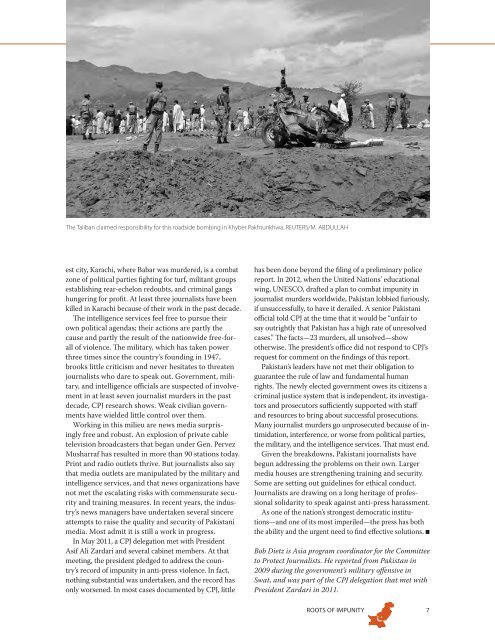CPJ.Pakistan.Roots.of.Impunity
CPJ.Pakistan.Roots.of.Impunity
CPJ.Pakistan.Roots.of.Impunity
Create successful ePaper yourself
Turn your PDF publications into a flip-book with our unique Google optimized e-Paper software.
The Taliban claimed responsibility for this roadside bombing in Khyber Pakhtunkhwa. REUTERS/M. ABDULLAH<br />
est city, Karachi, where Babar was murdered, is a combat<br />
zone <strong>of</strong> political parties fighting for turf, militant groups<br />
establishing rear-echelon redoubts, and criminal gangs<br />
hungering for pr<strong>of</strong>it. At least three journalists have been<br />
killed in Karachi because <strong>of</strong> their work in the past decade.<br />
The intelligence services feel free to pursue their<br />
own political agendas; their actions are partly the<br />
cause and partly the result <strong>of</strong> the nationwide free-forall<br />
<strong>of</strong> violence. The military, which has taken power<br />
three times since the country’s founding in 1947,<br />
brooks little criticism and never hesitates to threaten<br />
journalists who dare to speak out. Government, military,<br />
and intelligence <strong>of</strong>ficials are suspected <strong>of</strong> involvement<br />
in at least seven journalist murders in the past<br />
decade, <strong>CPJ</strong> research shows. Weak civilian governments<br />
have wielded little control over them.<br />
Working in this milieu are news media surprisingly<br />
free and robust. An explosion <strong>of</strong> private cable<br />
television broadcasters that began under Gen. Pervez<br />
Musharraf has resulted in more than 90 stations today.<br />
Print and radio outlets thrive. But journalists also say<br />
that media outlets are manipulated by the military and<br />
intelligence services, and that news organizations have<br />
not met the escalating risks with commensurate security<br />
and training measures. In recent years, the industry’s<br />
news managers have undertaken several sincere<br />
attempts to raise the quality and security <strong>of</strong> <strong>Pakistan</strong>i<br />
media. Most admit it is still a work in progress.<br />
In May 2011, a <strong>CPJ</strong> delegation met with President<br />
Asif Ali Zardari and several cabinet members. At that<br />
meeting, the president pledged to address the country’s<br />
record <strong>of</strong> impunity in anti-press violence. In fact,<br />
nothing substantial was undertaken, and the record has<br />
only worsened. In most cases documented by <strong>CPJ</strong>, little<br />
has been done beyond the filing <strong>of</strong> a preliminary police<br />
report. In 2012, when the United Nations’ educational<br />
wing, UNESCO, drafted a plan to combat impunity in<br />
journalist murders worldwide, <strong>Pakistan</strong> lobbied furiously,<br />
if unsuccessfully, to have it derailed. A senior <strong>Pakistan</strong>i<br />
<strong>of</strong>ficial told <strong>CPJ</strong> at the time that it would be “unfair to<br />
say outrightly that <strong>Pakistan</strong> has a high rate <strong>of</strong> unresolved<br />
cases.” The facts—23 murders, all unsolved—show<br />
otherwise. The president’s <strong>of</strong>fice did not respond to <strong>CPJ</strong>’s<br />
request for comment on the findings <strong>of</strong> this report.<br />
<strong>Pakistan</strong>’s leaders have not met their obligation to<br />
guarantee the rule <strong>of</strong> law and fundamental human<br />
rights. The newly elected government owes its citizens a<br />
criminal justice system that is independent, its investigators<br />
and prosecutors sufficiently supported with staff<br />
and resources to bring about successful prosecutions.<br />
Many journalist murders go unprosecuted because <strong>of</strong> intimidation,<br />
interference, or worse from political parties,<br />
the military, and the intelligence services. That must end.<br />
Given the breakdowns, <strong>Pakistan</strong>i journalists have<br />
begun addressing the problems on their own. Larger<br />
media houses are strengthening training and security.<br />
Some are setting out guidelines for ethical conduct.<br />
Journalists are drawing on a long heritage <strong>of</strong> pr<strong>of</strong>essional<br />
solidarity to speak against anti-press harassment.<br />
As one <strong>of</strong> the nation’s strongest democratic institutions—and<br />
one <strong>of</strong> its most imperiled—the press has both<br />
the ability and the urgent need to find effective solutions. n<br />
Bob Dietz is Asia program coordinator for the Committee<br />
to Protect Journalists. He reported from <strong>Pakistan</strong> in<br />
2009 during the government’s military <strong>of</strong>fensive in<br />
Swat, and was part <strong>of</strong> the <strong>CPJ</strong> delegation that met with<br />
President Zardari in 2011.<br />
ROOTS OF IMPUNITY 7


